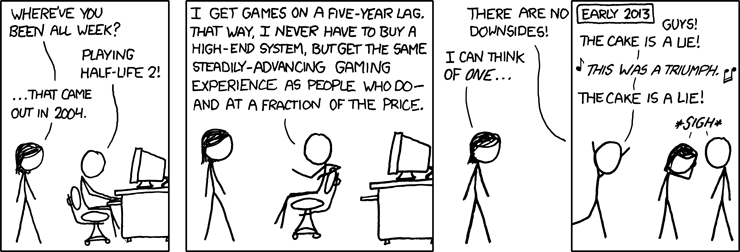I'm seeing two recurring themes that people cite as reasons for getting put off of PC gaming: Cost and Tech Knowledge
Cost: This is misnomer that is exacerbated by companies such as alienware and Dell (yes, I know Dell owns AW). Alienware markets decent gaming systems at incredibly inflated prices, and Dell releases 'normal' PCs with horribly crippled graphics. If you buy the individual PC parts from places like newegg.com or zipzoomfly.com, you can get a solid PC gaming tower for around $600 (not including the monitor/speakers/mouse/keyboard - those components don't need to be upgraded every time.)
Back in May, Tom's hardware did a system builder marathon and put together a PC and ran it through several benchmarks [http://www.tomshardware.com/reviews/core-2-overclock,2310.html] The result was a PC that could handle even juggernaut titles like Crysis and Far Cry 2 rather well. Some mild overclocking pushed performance up 20% further still. The cost of this machine? $600
Another thing often mentioned is the "constant upgrading", which is completely false. Yes, if you want to run everything at maximum graphics all the time, you will be upgrading fairly often, but most people are ok with turning a setting or two down to "medium" when needed. A good video card can last 2-4 years before it needs to be upgrading, and even longer for other components. If you still think PCs are too expensive, keep in mind the myriad of other things PCs can do, such as browse this very forum and read this very post.
Tech knowledge requirement: Computers are often seen as intimidating beasts, powered by the tears of frustrated users and magic. Really, this is just fear of the unknown - basic hardware knowledge is not that tough at all. Software knowledge can be a little more tricky, as that's what users directly interact with on a computer so it's more important to be capable with software rather than the hardware. A lot of people in this thread have mentioned having to fiddle with hours on their computers to fix glitches and bugs and crashes and who knows what else. This probably isn't so much as there being a big problem with peoples' computers as it is users just not knowing how to fix them. I'm a pretty savvy PC user and I haven't had any game mysteriously not work that didn't take me more than ~15 minutes to figure out.
Now, if you're just not interested in learning about PC hardware/software but still want to game on a PC, there are lots of places on the web where you can ask for advice. I'm sure there are many users on the Escapist who wouldn't mind giving some advice or answering questions, such as myself. I love talking about PCs =D
PCs by nature offer a level of flexibility and content control that just doesn't exist on the consoles. This is most easily seen through the plethora of user-created content, such as mods and skins for various games. Another strong example is the console, where you can change variables used by the game engine to achieve amusing results. For example, have you ever tried having 150 zombie hordes in L4D? Made a spell in Oblivion that paralyzed everyone in 400 meters, or increased your speed by 7000? Or better yet, used the console to spawn a critical NPC that had gone missing, so you can continue with the game? I love having these options open to me, so I will almost always prefer to game on the PC. The only game that has ever been released on both console and PC that I opted for the console version was halo, because the PC port was pretty terrible.
Of course, if you prefer the feel of a control in your hand, your couch on your back and the TV across the room, there's nothing wrong with that. I don't ask everyone to accept and love PC gaming, I just ask that you don't dismiss PC gaming for reasons that are based on public opinion rather than fact.


